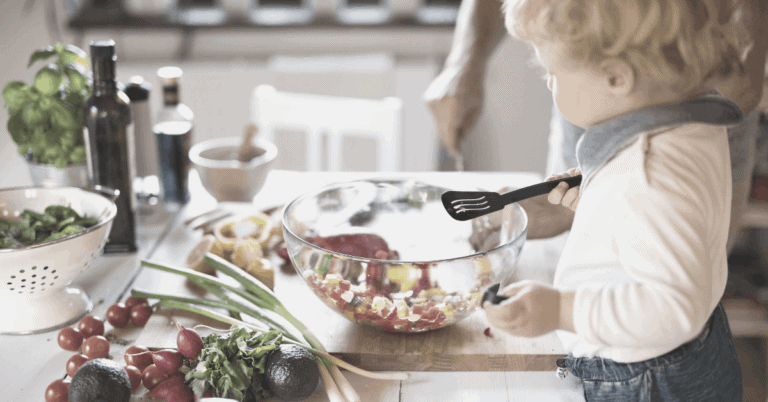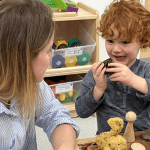



Registered Nutritionist


As a parent, you receive an overwhelming amount of advice from the internet, television, and family members about your child’s nutrition. To help you navigate this a little easier, we’ve spoken to Registered Nutritionist Janet Aylott from the Early Years Nutrition partnership your most commonly asked questions.
This is a list we would love to continually update to help as many parents out as possible so if you’d like to ask a question, please send it to info@fennies.com for Janet to answer.
A: Young children are like sponges and are always open to new experiences and opportunities! Try a new food every few days if it is possible and eat together as a family if you can. Often a child will want to try what Mummy and Daddy are having, rather than eating a meal just for them. Use stickers and reward charts to record when they try new foods, and whether they like them or not. And remember it can take up to 10 exposures to a new taste for the tastebuds to get used to it so don’t give up after one or two attempts!


A: Offering children two courses at mealtimes allows multiple opportunities for them to gain good nutrition. Under 5s only have small tummies so giving them two small portions of different foods, rather than one larger portion of the main course allows us to increase the range of nutrients, textures and tastes that they are experiencing.
It also helps to prevent a hierarchy of food likes and dislikes by putting all food on a level playing field whether it is savoury or sweet. Food should never be used as a treat or a punishment, and the same applies to pudding. Offering pudding whether a child has eaten their main course or not, without any fuss, tells the child that there is nothing ‘special’ about pudding, and that it’s just another course that they can enjoy whatever happens with the main meal.
All Fennies menus are accredited with the EYNP and we follow strict criteria to ensure that all the food we serve fits within the guidelines. Puddings are varied, and more often than not, are based on fresh fruit. Where homemade puddings such as cakes and biscuits are offered, these all contain fruit or vegetables for example chocolate and beetroot cake or fruity raisin cookies and are usually served with a dairy side such as yogurt or crème Fraiche. Added sugar is kept to a minimum.
A: Pre-schoolers and toddlers are very often guided by the actions of those around them. At nursery, we all sit together to eat our meals, and children are encouraged to be independent in serving themselves and in helping others. We talk about the food that we are serving and encourage the children to try everything that is on offer. Food is never forced upon children who refuse, but we praise those that try.
The home environment can be very different for the children – plates and cutlery might not be the right size, and as parents, we often ‘dish up’ large portions that we would expect a child to eat, rather than the size that they can maybe manage. Invest in some smaller plates and cutlery and encourage your child to help set the table and to serve themselves wherever possible.
Try not to make an issue out of mealtimes – if your child refuses a meal, encourage them to try but if they don’t just remove the plate and offer pudding without fuss. If other children in the family are good eaters, praise them openly.


A: There is no right or wrong way when it comes to giving treats to your children, however, it is important to try not to make foods high in sugar, salt, or fat a ‘forbidden fruit.’ Allowing your child to have some access to these ‘treat’ foods will help them to include them as part of an overall healthy and balanced diet. Completely ruling out these foods can mean that they become the food that the child desperately wants which can cause issues later in life.
It is best to limit foods higher in sugar to mealtimes, rather than offer them as a snack, to support good dental practice. So a small amount of chocolate or sweets after a meal is fine but stick to more savoury snacks or fruit at snacktime.


A: Organic foods are produced without pesticides and comply with the standards of organic farming. This can mean that the produce is fresher. In the UK, however, there are strict regulations relating to the levels of pesticides permitted in non-organic farming, and therefore levels are very low in general produce.
There are no proven nutritional benefits of choosing organic food, so it is down to personal choice based on other factors such as the environment.
A: Fennies has a strict policy on special dietary requirements, and where a child has been medically diagnosed with a food allergy or intolerance, the Manager and Chef will work with the parent to ensure the safety of any food that the child is exposed to in the nursery, and suitable alternatives will be supplied.
A: Depending on the type of intolerance, and the change required from the standard nursery menu, our chefs are able to provide suitable alternative dishes. Where multiple allergies or intolerances mean the child requires a very restricted diet, we will discuss requirements with our Registered Nutritionist or the wider healthcare support team.
A: Children can start to be involved in cooking activities at a very young age. Within the nursery we regularly do cooking activities with the children including smoothie making, chopping fruit to make kebabs, and mixing cakes and biscuits for special events. Food role play is also an integral part of learning so activities like going to the supermarket, playing shops at home, or using food for art can be a great way to encourage children to talk about food. There are lots of ideas for cooking with pre-schoolers on foodafactoflife.org.


A: The benefits of involving children in cooking and learning about nutrition are boundless! If children are able to understand where their food comes from, how it feels, what it can be made into, and most importantly how it tastes, it will set them up on a journey of curiosity. Food-based learning activities can incorporate so many other areas of the curriculum too – counting, vocabulary, reading, history, geography, caring for others…….the list is endless!












View All
This website uses cookies so that we can provide you with the best user experience possible. Cookie information is stored in your browser and performs functions such as recognising you when you return to our website and helping our team to understand which sections of the website you find most interesting and useful.
You can read out full privacy policy here
Strictly Necessary Cookie should be enabled at all times so that we can save your preferences for cookie settings.
If you disable this cookie, we will not be able to save your preferences. This means that every time you visit this website you will need to enable or disable cookies again.